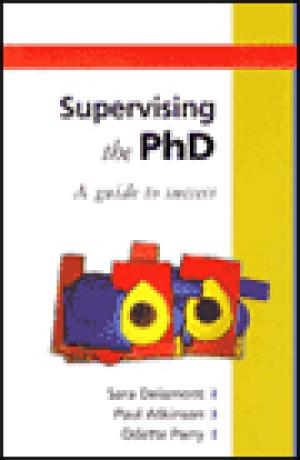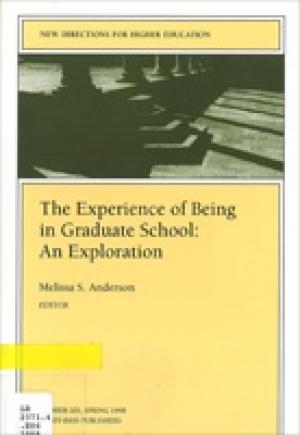Resources

This monograph presents results and recommendations from a project designed as a collaborative effort to prepare graduate students in the humanities for careers as scholar-teachers within institutions committed to liberal education. The project's two principle activities are discussed under the following headings: (1) Encountering Campus Cultures: Discovering the Responsibilities of College Teachers; and (2) Seminars: Reflecting on the Responsibilities of College Teachers. The first of these activities involved the Teaching Fellows in campus visits during which they attended department and faculty meetings, observed and sometimes taught classes, and met with individual faculty members who assumed mentoring roles and with whom every aspect of the campus, cultural, career and professional life of the college teacher could be explored. The second activity provides the Teaching Fellows with an opportunity to reflect on what they learned at the colleges and involves two kinds of seminar: (1) the core seminar, which brings the experience of contact/encounter into the structure of graduate training; and (2) the disciplinary seminar, which focuses on the connection between scholarly work and teaching, helps prepare the graduate students within their disciplines, and serves as a means of reimagining and restructuring the graduate programs themselves. Findings show that doctoral students, if given the chance, are eager to engage in the work of academic leadership, even at the beginning of their careers and that a major factor in enhancing their willingness to assume an active role is their encounters with college faculty members. Several recommendations are offered and discussed for future consideration. These are: (1) that coalitions should be built to promote reform; (2) that graduate training must include preparation for the full range of professional responsibilities, especially teaching; (3) that support and incentives should be built for participation of graduate educators in these reform efforts; and (4) that alternative, especially collaborative, models should be developed for improving graduate preparation. (From the Publisher)

Each year, hundreds of academics begin new faculty appointments. Some are just launching new careers, while others are advancing to new campuses. As faculty members and their institutions struggle to ease the passage to a new environment, they are faced with critical questions. What are the challenges of the transition process? And how does that process differ for first-time faculty and seasoned faculty? Drawing on a study conducted by researchers at the National Center on Postsecondary Teaching, Learning, and Assessment, Faculty in New Jobs shows how faculty and institutions can work together to ease the transition to a new job and facilitate the process of mastering academic work. Robert Menges and his associates offer practical, real-world advice covering all phases of the faculty career--from the difficult early process of settling in, to becoming socially and academically established, to ultimately building the institutional supports necessary for a successful career. The authors provide newcomers with valuable strategies for adapting to campus culture, building professional relationships, establishing a teaching style, and successfully juggling the diverse responsibilities of the faculty role. They also explain what institutions can do to select, support, and evaluate faculty more effectively. They describe the institutional climate that supports effective faculty transitions into and out of academia. They discuss what administrators can do to help faculty better understand and participate in the institutional culture, while also challenging and changing it in positive ways. (From the Publisher)

"This handbook provides essential information on regulations and procedures. It is a compilation of policy and procedure statements from a variety of the Department, College of Arts and Science, and the University Graduate School documents. It is intended as a guide to fulfilling the responsibilities associated with an appointment as an Associate Instructure"

Presenting numerous activities--for both individuals and groups--designed to foster self-knowledge and growth in teaching, the authors examine the primary elements of the teaching-learning exchange. Valuable special resources, including scales for measuring beliefs and values about teaching describes individual teaching styles. (From the Publisher)

Many faculty and graduate students from other countries expect language difficulties when they teach, but are unprepared for other surprises: different cultures make different assumptions about the academic background of college students, how students learn, the appropriate roles of teachers and students, and even the fundamental purpose of a college education. The third edition of Teaching American Students explains the expectations of undergraduates at American colleges and universities and offers practical strategies for teaching, including how to give clear presentations, how to teach interactively, and how to communicate effectively. Also included are illustrative examples as well as advice from international faculty and teaching assistants. Appendices offer concrete suggestions on topics from planning the first day of class to grading papers and problem sets. (From the Publisher)

This guide to supervising doctoral research is a practical handbook for both the novice and the experienced higher degree supervisor. It looks at how to get students to produce good PhD theses on time, and how to prevent failed theses. (From the Publisher)

There is much at stake in the graduate enterprise. Here students are prepared to become leaders, professionals, researchers, and scholars who will be responsible for the advancement of our knowledge and well-being. But what of the students themselves? What do they go through in graduate school? What is the graduate experience like? This volume of New Directions for Higher Education addresses the graduate experience from the standpoint of the students themselves. From a variety of perspectives and across many fields of study, these chapters present what students have reported about their experience through interviews, surveys, ongoing discussions, and autobiographies. This is the 101st issue of the quarterly journal New Directions for Higher Education. For more information on the series, please see the Journals and Periodicals section. (From the Publisher)